高考英语语法—特殊句式课件(41张)
图片预览
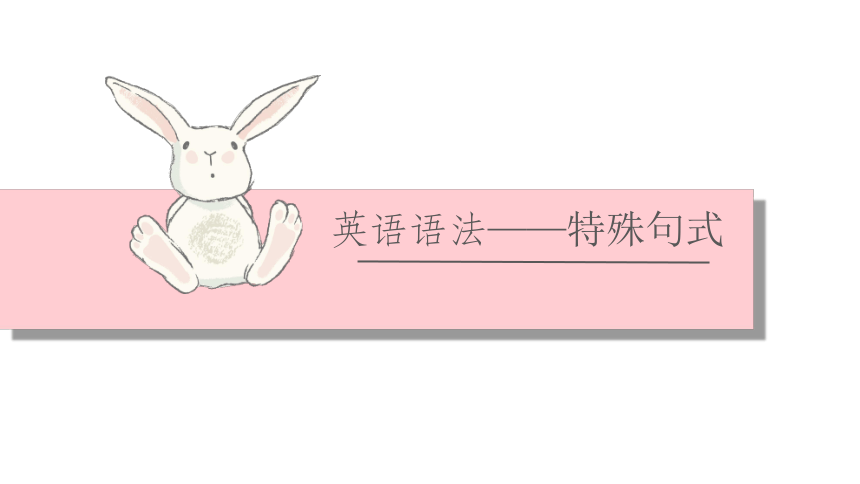
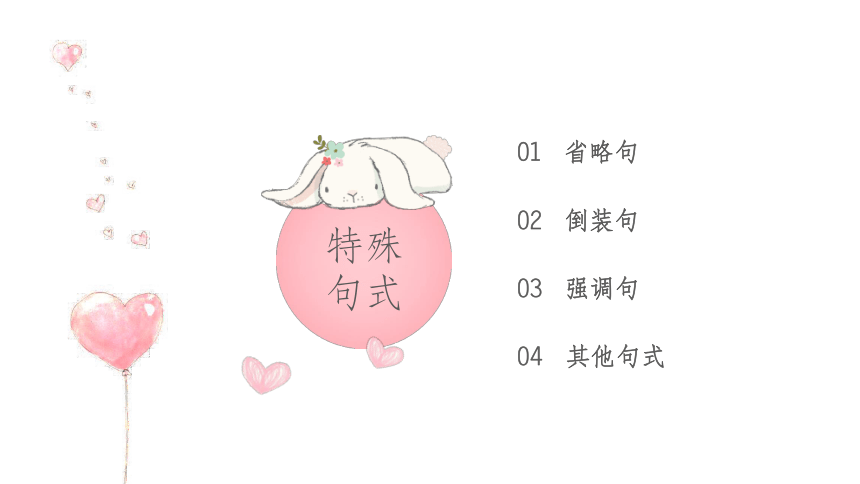
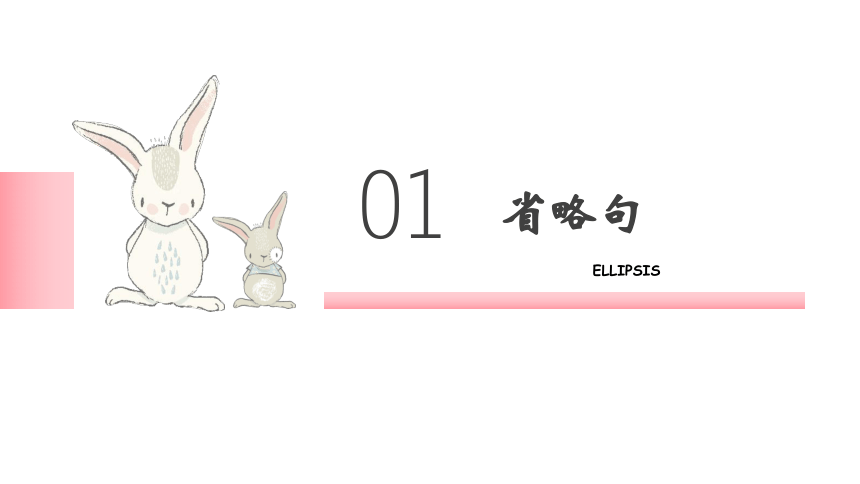
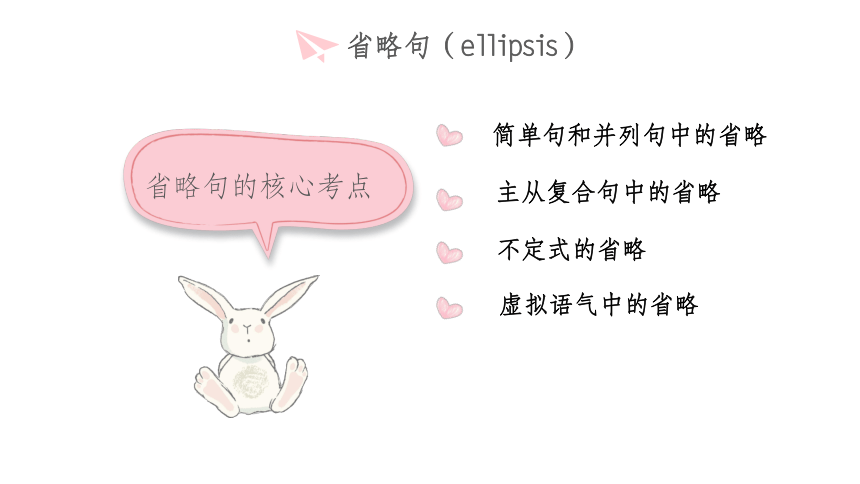
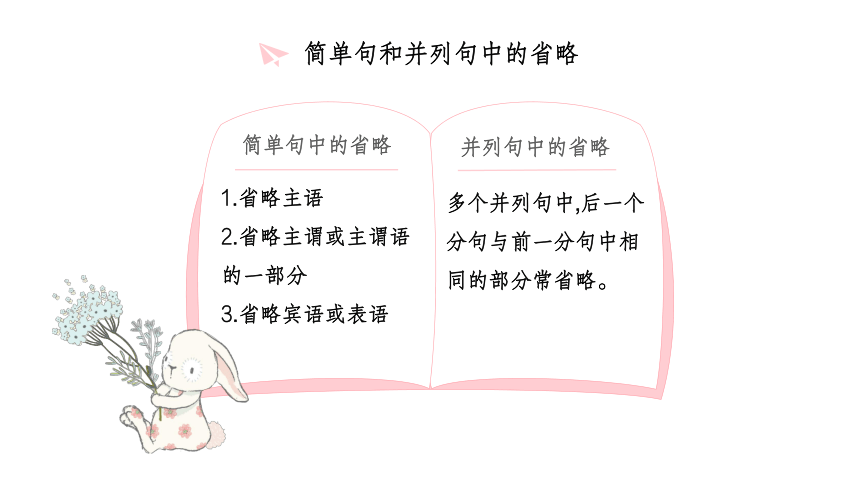
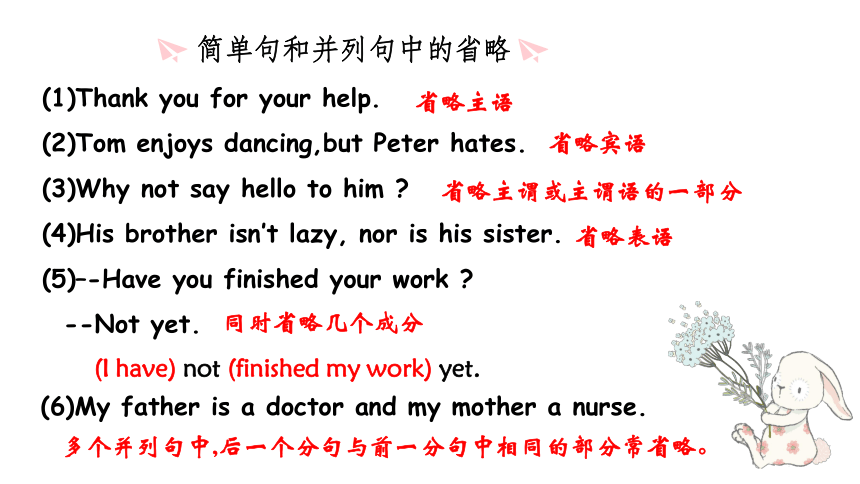
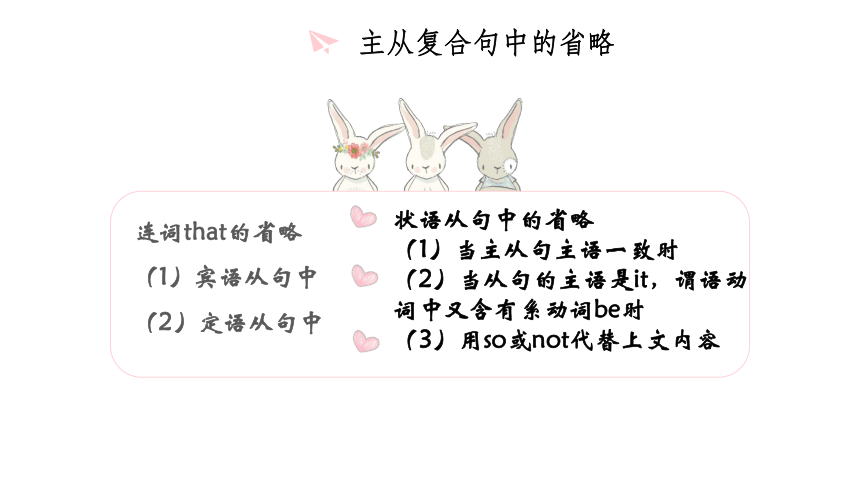
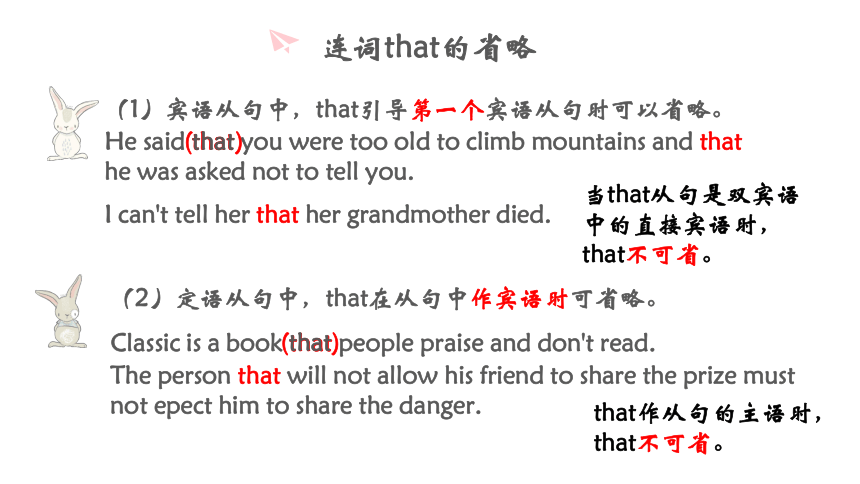
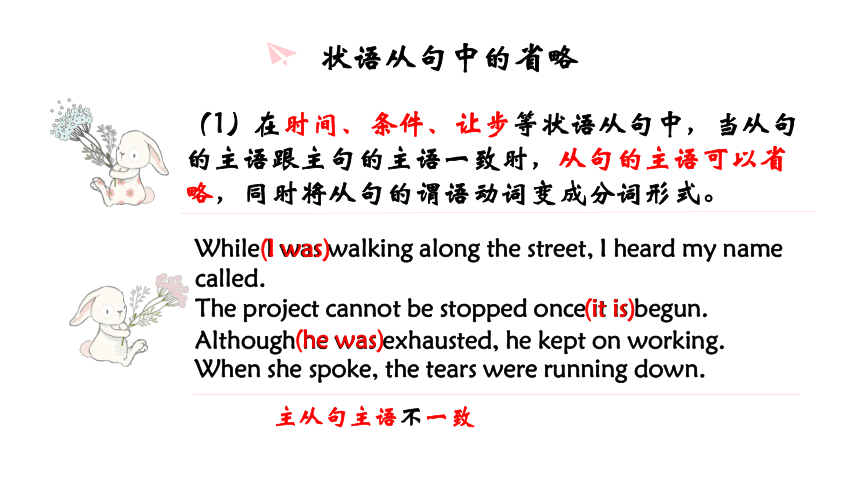

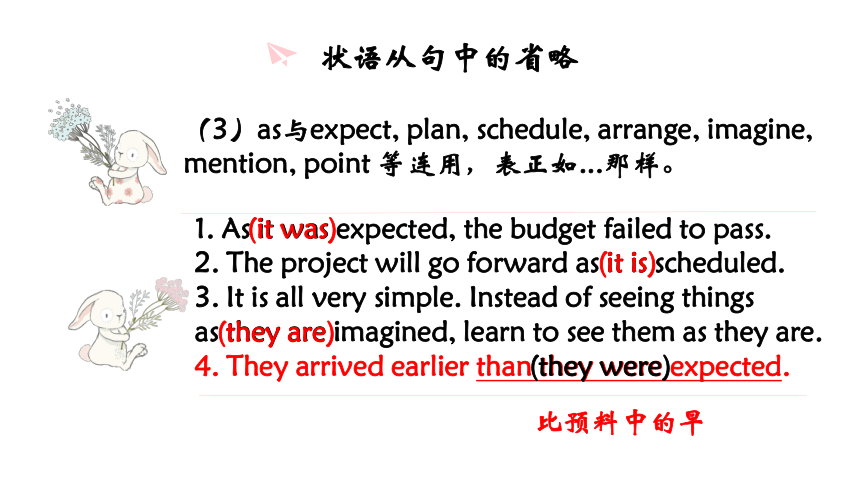
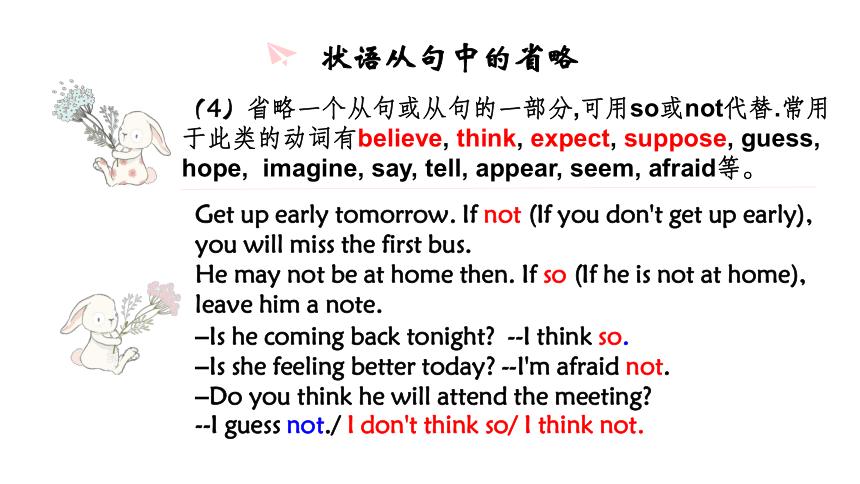
文档简介
(共41张PPT)
英语语法——特殊句式
特殊句式
01 省略句
02 倒装句
03 强调句
04 其他句式
省略句
ELLIPSIS
01
省略句(ellipsis)
简单句和并列句中的省略
不定式的省略
虚拟语气中的省略
省略句的核心考点
主从复合句中的省略
简单句中的省略
1.省略主语
2.省略主谓或主谓语的一部分
3.省略宾语或表语
简单句和并列句中的省略
并列句中的省略
多个并列句中,后一个分句与前一分句中相同的部分常省略。
简单句和并列句中的省略
(1)Thank you for your help.
(2)Tom enjoys dancing,but Peter hates.
(3)Why not say hello to him ?
(4)His brother isn’t lazy, nor is his sister.
(5)–-Have you finished your work ?
--Not yet.
省略主语
省略宾语
省略主谓或主谓语的一部分
省略表语
同时省略几个成分
(I have) not (finished my work) yet.
(6)My father is a doctor and my mother a nurse.
多个并列句中,后一个分句与前一分句中相同的部分常省略。
连词that的省略
(1)宾语从句中
(2)定语从句中
主从复合句中的省略
状语从句中的省略
(1)当主从句主语一致时
(2)当从句的主语是it,谓语动词中又含有系动词be时
(3)用so或not代替上文内容
连词that的省略
(1)宾语从句中,that引导第一个宾语从句时可以省略。
He said that you were too old to climb mountains and that he was asked not to tell you.
I can't tell her that her grandmother died.
(2)定语从句中,that在从句中作宾语时可省略。
Classic is a book that people praise and don't read.
The person that will not allow his friend to share the prize must not epect him to share the danger.
(that)
(that)
当that从句是双宾语中的直接宾语时,that不可省。
that作从句的主语时,that不可省。
(1)在时间、条件、让步等状语从句中,当从句的主语跟主句的主语一致时,从句的主语可以省略,同时将从句的谓语动词变成分词形式。
状语从句中的省略
While I was walking along the street, I heard my name called.
The project cannot be stopped once it is begun.
Although he was exhausted, he kept on working.?
When she spoke, the tears were running down.
(I was)
(it is)
主从句主语不一致
(he was)
(2)当从句的主语是it,谓语动词中又含有系动词be时,可以把it和be动词一起省略。此时构成连词(if, unless, when, whenever等)+形容词的结构。
状语从句中的省略
Unless it is necessary, you'd better not refer to the dictionary.
Please come here as soon as it is possible.
(it is)
(it is)
if ever,if any,if so,if necessary,if not better/ worse/ taller...than
Jim plays football as well as, if not better than, Mike.
1. As it was expected, the budget failed to pass.
2. The project will go forward as it is scheduled.
3. It is all very simple. Instead of seeing things
as they are imagined, learn to see them as they are.
4. They arrived earlier than they were expected.
(3)as与expect, plan, schedule, arrange, imagine, mention, point 等连用,表正如...那样。
状语从句中的省略
(it was)
(they are)
(it is)
(they were)
比预料中的早
(4)省略一个从句或从句的一部分,可用so或not代替.常用于此类的动词有believe, think, expect, suppose, guess, hope, imagine, say, tell, appear, seem, afraid等。
状语从句中的省略
Get up early tomorrow. If not (If you don't get up early), you will miss the first bus. He may not be at home then. If so (If he is not at home), leave him a note.
–Is he coming back tonight? --I think so.
–Is she feeling better today? --I'm afraid not.
–Do you think he will attend the meeting?
--I guess not./ I don't think so/ I think not.
(3)在感官动词和使役动词(如一感feel, 二听hear, listen to, 三使唤have, let, make, 五观看see, watch, observe, notice, look at)后接不定时作宾语补足语时,不定式to要省略,但在被动语态中须将to 复原。
I saw the boy fall from the tree.
The boy was seen to fall from the tree.
不定式符号to的省略
(1)并列的不定式可省去后面的 to。
I told him to sit down and wait for a moment.
(2)动词不定式作介词but, besides, except的宾语,前面有动词do,动词不定式符号to省略。 We have nothing to do but wait.
We have no choice but to wait.
当省略不定式的内容时,则须保留不定式符号to,若to后面有be, have, have been,通常一起保留。
不定式to后面内容的省略
①I asked him to see the film, but he didn't want to.
②—Are you a sailor?
—No, but I used to be.
③—He hasn't finished yet.
—Well, he ought to have.
虚拟语气中的省略
当虚拟条件句的谓语部分含有were, should, had时,可以省略if,而将were, should, had置于句首。
①If she were in charge, she would do things differently.
=Were she in charge, she would do things differently.
②If you should change your mind, no one would blame you.
=Should you change your mind, no one would blame you.
③If I had not seen it with my own eyes, I would not have believed it.
= Had I not seen it with my own eyes, I would not have believed it.
Rewrite the sentences taking out the unnecessary parts.
The burn that she got from the iron was red and it was very painful.
A boy was on the left side of the sick woman, and a girl was on the right side of the sick woman.
She has a daughter who is in hospital.
He went to the doctor because he had to go to the doctor.
Did she pass the first aid test that she did yesterday or didn't she pass?
She couldn't decide whether to send him to hospital or not
to send him to hospital.
7. When your nose is bleeding, you should bend forward so that the blood runs out of your nose and the blood doesn't run down your throat.
8. Only some of the students have done a first aid course but most of the students haven't done a first aid course.
not
The first aid exam was approaching. Because he was interested in first aid, John went to the school library to search for books in this field. He read two books of them. The first book he read was more useful than the second book that he read. The librarian told him that he could borrow both of them if he wanted to borrow them. John went over the knowledge about first aid while his classmates didn't go over the knowledge about first aid. To his mother's delight, he did better in his first aid exam than he was expected to do.
Read the following passage and leave out some unnecessary words.
The first aid exam was approaching. (Because he was) interested in first aid, John went to the school library to search for books in this field. He read two (books) of them. The first book he read was more useful than the second (book that he read) . The librarian told him that he could borrow both of them if he wanted to (borrow them). John went over the knowledge about first aid while his classmates didn’t (go over the knowledge about first aid). To his mother’s delight, he did better in his first aid exam than (he was) expected (to do).
Read the following passage and leave out some unnecessary words.
The first aid exam was approaching. Interested in first aid, John went to the school library to search for books in this field. He read two of them. The first book he read was more useful than the second. The librarian told him that he could borrow both of them if he wanted to. John went over all the knowledge about first aid while his classmates didn't. To his mother's delight, he did better in his first aid exam than expected.
倒装句
inversion
02
倒装句
部分倒装指将谓语的一部分,如be动词、助动词或情态动词移到主语之前;如果句中的谓语没有助动词或情态动词,则需添加助动词do, does 或did,并将其移到主语之前。
完全倒装指整个谓语部分移到主语之前。
一般来说,句子主干结构按照“主语+谓语”的顺序排列,叫自然语序。有时为了特殊的原因(疑问、强调、平衡),从而使句子语序变为谓语+主语或助动词/情态动词/be动词+主语的结构叫倒装语序。
部分倒装句
Never have I read such a book.
Seldom does he go back home to see his parents.
By no means will I say sorry to him.
Little do we know his life.
1.表示否定意义的词或短语 (如 never, hardly, seldom, little, few, not until, not, not only, no sooner, no longer, nowhere, by no means, in no way等)置于句首时,其后用部分倒装。
①他不仅学习认真,而且还很乐于助人。
部分倒装句
②直到他摘下墨镜我才认出他来。
③他刚到车站,公交
车就开走了。
①Not only is he hardworking, but also he is helpful.
②Not until he took off his sunglasses did I recognize him.
③No sooner had he got to the station than the bus left.
2. 当only引导状语置于句首时,主句习惯上要用部分倒装语序。
部分倒装句
①Only in this way can you do it well.
②Only then did we decide to answer violence with violence.
③Only after her mother came to help her for the first few months was she allowed to begin her project.
only+in this way
by doing...
then
状语从句
(时间或条件)
部分倒装句
3. 当前者情况也适用于后者时,用“so / neither / nor+助动词+主语”这样的倒装句式。
①He can sing English songs and I can too.
→ He can sing English songs and so can I.
②He didn't see the film, and I didn't either.
→ He didn't see the film, and neither did I.
③I don't agree that they should return the treasure to Russia if they find it. ______ do I think they should give it to any government.
④He likes music but doesn't like sports. ____________ me.
Nor
So it is with
当前者既有肯定也有否定或出现不同的助动词时,后者情况同前者,用so it is with sb.。
部分倒装句
4.当so…that句式的so+adj./ adv 部分置于句首时,其后习惯上要用部分倒装语序。
①The weather was so cold that we had to stay at home. → So cold was the weather that we had to stay at home.
②他学习如此努力以致于取得了很大的进步。
→So hard did he work that he made such great progress.
→So hard-working was he that he made such great progress.
部分倒装句
5. as 引导让步状语从句时,需将表语、谓语或状语(名词、形容词、副词、分词、实义动词)提前,若名词为单数可数名词,则省略冠词。
①Though/ Although/ While he is a child, he knows something about electricity. →________________, he knows something about electricity.
②Though he was tired, he continued to work. → ________________, he continued to work.
③ ______ as he might, he failed the maths exam.
尽管他尽力了,他还是没通过数学考试。
④Amazing ____ it may seem, Wednesday night was a quiet night.
as
Try
Child as he is
Tired as he was
虚拟语气中的省略倒装
6.当虚拟条件句的谓语部分含有were, should, had时,可以省略if,而将were, should, had置于句首。
①If she were in charge, she would do things differently.
=Were she in charge, she would do things differently.
②If you should change your mind, no one would blame you.
=Should you change your mind, no one would blame you.
③If I had not seen it with my own eyes, I would not have believed it.
= Had I not seen it with my own eyes, I would not have believed it.
“may+动词原形”表示祝愿,通常把may置于句首,构成倒装语序。 May you succeed!
完全倒装句
(1)当表示地点(方位)的介词短语位于句首时,句子要完全倒装。
A big tree stands in front of the door.
→ In front of the door stands a big tree.
A picture is on the wall.
→ On the wall is a picture.
(2)表示地点(方位)或时间的副词(如here/ there, up/ down, in/ out, off/ away, now/ then, next等)位于句首时,句子要用完全倒装。
The door opened and a yellow dog rushed out.
→ The door opened and out rushed a dog.
注意:如果主语是人称代词则不能完全倒装。另外这类倒装句式一般只用一般现在时和一般过去时。
如:Here he comes.
Away they went.
(3) 为平衡句子结构,或使上下文衔接紧密,而将作表语的介词短语、形容词、副词或分词提到句首,引起倒装。
完全倒装句
Gone forever are the days when the Chinese people had to use foreign oil.
中国人民用洋油的日子已经一去不复返了。
Present at the meeting were Professor White, Professor Smith and many other guests.
怀特教授、史密斯教授和许多其他来宾出席了会议。
强调句
emphasis
03
强调句(emphasis)
对谓语动词的强调
强调句的特殊疑问句
强调句的核心考点
强调句的一般疑问句
强调句的陈述句
强调句与其他句子的辨析
对谓语动词的强调
使用助动词do,does和did对谓语动词进行强调。
①First impressions really do count.
第一印象真的很重要。
②He did write to you last week.
他上周的确给你写信了。
③Tom does study hard now.
汤姆现在确实学习很努力。
去掉It is/ was...that/ who ...,这个句子若还是完整的,则是强调句。
①It was Tom that/ who we met at the school gate.
②It's in the Summer Olympics that you have the running races, together with swimming, sailing and all the team sports.
③It was my sister who first had the idea to cycle along the entire Mekong River from where it begins to where it ends.
④It was hard work and determination as well as her gentle nature that got her into medical school.
⑤It is believed that dogs know men by smell.
强调句的陈述句:It is/ was +被强调部分+ that/ who (强调人) +句子剩余部分
强调句的陈述句:It is/ was +被强调部分+ that/ who (强调人)+句子剩余部分
①It was Tom that/ who we met at the school gate.
②It's in the Summer Olympics that you have the running races, together with swimming, sailing and all the team sports.
③It was my sister who first had the idea to cycle along the entire Mekong River from where it begins to where it ends.
④It was hard work and determination as well as her gentle nature that got her into medical school.
(强调状语)
(强调主语)
(强调主语)
(强调宾语)
(主语、宾语或状语)
①It was Tom that/ who we met at the school gate.
Was it Tom that/ who we met at the school gate?
②It's in the Summer Olympics that you have the running races, together with swimming, sailing and all the team sports.
Is it in the Summer Olympics that you ...... sports?
③It was my sister who first had the idea to cycle along the entire Mekong River from where it begins to where it ends.
Was it my sister who/ that first had the idea....... it ends?
④It was hard work and determination as well as her gentle nature that got her into medical school.
Was it hard work and determination...that ... medical school?
强调句的一般疑问句:Is/ Was it +被强调部分+ that/ who (强调人) +句子剩余部分?
①It was Tom that/ who we met at the school gate.
Who was it that we met at the school gate?
②It's in the Summer Olympics that you have the running races, together with swimming, sailing and all the team sports.
Where is it that you ...... sports?
③It was my sister who first had the idea to cycle along the entire Mekong River from where it begins to where it ends.
Who was it that first had the idea....... it ends?
④It was hard work and determination as well as her gentle nature that got her into medical school.
What was it that got her into medical school?
强调句的特殊疑问句:特殊疑问词+is/ was it that/ who +句子剩余部分?
在对not...until...结构中的until时间状语或时间状语从句进行强调时,要将句中的not移至until之前,构成:It is/was not until...that...。注意that从句中的谓语动词要变成肯定形式,而且不再采用倒装语序。
not…until…句型的强调句
①He didn't go to bed until ten o'clock.
→Not until ten o'clock did he go to bed.
→It was not until ten o'clock that he went to bed.
②I didn't realize she was a famous film star until she took off her dark glasses.
→Not until she took off ...glasses did I realize she ...star.
→It was not until she took off her dark glasses that I realized she was a famous film star.
强调句与其他句子的辨析
选词填空(when, that, where, before, since, that)
(1)It was about 600 years ago _________ the first clock with a face and an hour hand was made.
(2)It was twenty miles from our city to the village _________ the accident happened.
(3)It was not long _________ he worked out the problem.
(4)The Foreign Minister said, “It is our hope__________ the two sides will work towards peace.
(5)It was December26, 1893 ________ Mao Zedong was born in the common village.
(6)How many years is it __________ your sister came to work here?
that
where
before
that
when
since
感叹句
(1)What+a/an+形容词+单数名词+主语+谓语!
=How+形容词+a/an+单数名词+主语+谓语!
(2)What+(形容词)+不可数名词/复数名词+主语+谓语!
(3)How+形容词/副词+主语+谓语!
(4)How+主语+谓语!
What a strange plant(=How strange a plant)! I've never seen it before.
这种植物真奇怪! 我以前从未见过。
The shocking news made me realize what terrible problems we would face.
这个惊人的消息使我意识到我们将面临多么严重的问题。
(常用来表示惊叹、赞美、喜悦等语气)
祈使句常用来表达命令、请求、禁止、建议、警告、劝告等。 祈使句的主语一般是第二人称you,但往往省略。 祈使句的否定形式一般在动词原形前加don't,也可用副词never构成。 祈使句的强调形式可以在句首加do。 祈使句的常见句型:
(1)祈使句+and+陈述句 “如果……就……”
(2)祈使句+or/otherwise+陈述句 “……否则……”
(3)名词词组(多含有more,another)+and+陈述句 “如果再……就……”
One more day,and I'll get everything ready.
再多给我一天, 我就会把一切准备好。
祈使句
英语语法——特殊句式
特殊句式
01 省略句
02 倒装句
03 强调句
04 其他句式
省略句
ELLIPSIS
01
省略句(ellipsis)
简单句和并列句中的省略
不定式的省略
虚拟语气中的省略
省略句的核心考点
主从复合句中的省略
简单句中的省略
1.省略主语
2.省略主谓或主谓语的一部分
3.省略宾语或表语
简单句和并列句中的省略
并列句中的省略
多个并列句中,后一个分句与前一分句中相同的部分常省略。
简单句和并列句中的省略
(1)Thank you for your help.
(2)Tom enjoys dancing,but Peter hates.
(3)Why not say hello to him ?
(4)His brother isn’t lazy, nor is his sister.
(5)–-Have you finished your work ?
--Not yet.
省略主语
省略宾语
省略主谓或主谓语的一部分
省略表语
同时省略几个成分
(I have) not (finished my work) yet.
(6)My father is a doctor and my mother a nurse.
多个并列句中,后一个分句与前一分句中相同的部分常省略。
连词that的省略
(1)宾语从句中
(2)定语从句中
主从复合句中的省略
状语从句中的省略
(1)当主从句主语一致时
(2)当从句的主语是it,谓语动词中又含有系动词be时
(3)用so或not代替上文内容
连词that的省略
(1)宾语从句中,that引导第一个宾语从句时可以省略。
He said that you were too old to climb mountains and that he was asked not to tell you.
I can't tell her that her grandmother died.
(2)定语从句中,that在从句中作宾语时可省略。
Classic is a book that people praise and don't read.
The person that will not allow his friend to share the prize must not epect him to share the danger.
(that)
(that)
当that从句是双宾语中的直接宾语时,that不可省。
that作从句的主语时,that不可省。
(1)在时间、条件、让步等状语从句中,当从句的主语跟主句的主语一致时,从句的主语可以省略,同时将从句的谓语动词变成分词形式。
状语从句中的省略
While I was walking along the street, I heard my name called.
The project cannot be stopped once it is begun.
Although he was exhausted, he kept on working.?
When she spoke, the tears were running down.
(I was)
(it is)
主从句主语不一致
(he was)
(2)当从句的主语是it,谓语动词中又含有系动词be时,可以把it和be动词一起省略。此时构成连词(if, unless, when, whenever等)+形容词的结构。
状语从句中的省略
Unless it is necessary, you'd better not refer to the dictionary.
Please come here as soon as it is possible.
(it is)
(it is)
if ever,if any,if so,if necessary,if not better/ worse/ taller...than
Jim plays football as well as, if not better than, Mike.
1. As it was expected, the budget failed to pass.
2. The project will go forward as it is scheduled.
3. It is all very simple. Instead of seeing things
as they are imagined, learn to see them as they are.
4. They arrived earlier than they were expected.
(3)as与expect, plan, schedule, arrange, imagine, mention, point 等连用,表正如...那样。
状语从句中的省略
(it was)
(they are)
(it is)
(they were)
比预料中的早
(4)省略一个从句或从句的一部分,可用so或not代替.常用于此类的动词有believe, think, expect, suppose, guess, hope, imagine, say, tell, appear, seem, afraid等。
状语从句中的省略
Get up early tomorrow. If not (If you don't get up early), you will miss the first bus. He may not be at home then. If so (If he is not at home), leave him a note.
–Is he coming back tonight? --I think so.
–Is she feeling better today? --I'm afraid not.
–Do you think he will attend the meeting?
--I guess not./ I don't think so/ I think not.
(3)在感官动词和使役动词(如一感feel, 二听hear, listen to, 三使唤have, let, make, 五观看see, watch, observe, notice, look at)后接不定时作宾语补足语时,不定式to要省略,但在被动语态中须将to 复原。
I saw the boy fall from the tree.
The boy was seen to fall from the tree.
不定式符号to的省略
(1)并列的不定式可省去后面的 to。
I told him to sit down and wait for a moment.
(2)动词不定式作介词but, besides, except的宾语,前面有动词do,动词不定式符号to省略。 We have nothing to do but wait.
We have no choice but to wait.
当省略不定式的内容时,则须保留不定式符号to,若to后面有be, have, have been,通常一起保留。
不定式to后面内容的省略
①I asked him to see the film, but he didn't want to.
②—Are you a sailor?
—No, but I used to be.
③—He hasn't finished yet.
—Well, he ought to have.
虚拟语气中的省略
当虚拟条件句的谓语部分含有were, should, had时,可以省略if,而将were, should, had置于句首。
①If she were in charge, she would do things differently.
=Were she in charge, she would do things differently.
②If you should change your mind, no one would blame you.
=Should you change your mind, no one would blame you.
③If I had not seen it with my own eyes, I would not have believed it.
= Had I not seen it with my own eyes, I would not have believed it.
Rewrite the sentences taking out the unnecessary parts.
The burn that she got from the iron was red and it was very painful.
A boy was on the left side of the sick woman, and a girl was on the right side of the sick woman.
She has a daughter who is in hospital.
He went to the doctor because he had to go to the doctor.
Did she pass the first aid test that she did yesterday or didn't she pass?
She couldn't decide whether to send him to hospital or not
to send him to hospital.
7. When your nose is bleeding, you should bend forward so that the blood runs out of your nose and the blood doesn't run down your throat.
8. Only some of the students have done a first aid course but most of the students haven't done a first aid course.
not
The first aid exam was approaching. Because he was interested in first aid, John went to the school library to search for books in this field. He read two books of them. The first book he read was more useful than the second book that he read. The librarian told him that he could borrow both of them if he wanted to borrow them. John went over the knowledge about first aid while his classmates didn't go over the knowledge about first aid. To his mother's delight, he did better in his first aid exam than he was expected to do.
Read the following passage and leave out some unnecessary words.
The first aid exam was approaching. (Because he was) interested in first aid, John went to the school library to search for books in this field. He read two (books) of them. The first book he read was more useful than the second (book that he read) . The librarian told him that he could borrow both of them if he wanted to (borrow them). John went over the knowledge about first aid while his classmates didn’t (go over the knowledge about first aid). To his mother’s delight, he did better in his first aid exam than (he was) expected (to do).
Read the following passage and leave out some unnecessary words.
The first aid exam was approaching. Interested in first aid, John went to the school library to search for books in this field. He read two of them. The first book he read was more useful than the second. The librarian told him that he could borrow both of them if he wanted to. John went over all the knowledge about first aid while his classmates didn't. To his mother's delight, he did better in his first aid exam than expected.
倒装句
inversion
02
倒装句
部分倒装指将谓语的一部分,如be动词、助动词或情态动词移到主语之前;如果句中的谓语没有助动词或情态动词,则需添加助动词do, does 或did,并将其移到主语之前。
完全倒装指整个谓语部分移到主语之前。
一般来说,句子主干结构按照“主语+谓语”的顺序排列,叫自然语序。有时为了特殊的原因(疑问、强调、平衡),从而使句子语序变为谓语+主语或助动词/情态动词/be动词+主语的结构叫倒装语序。
部分倒装句
Never have I read such a book.
Seldom does he go back home to see his parents.
By no means will I say sorry to him.
Little do we know his life.
1.表示否定意义的词或短语 (如 never, hardly, seldom, little, few, not until, not, not only, no sooner, no longer, nowhere, by no means, in no way等)置于句首时,其后用部分倒装。
①他不仅学习认真,而且还很乐于助人。
部分倒装句
②直到他摘下墨镜我才认出他来。
③他刚到车站,公交
车就开走了。
①Not only is he hardworking, but also he is helpful.
②Not until he took off his sunglasses did I recognize him.
③No sooner had he got to the station than the bus left.
2. 当only引导状语置于句首时,主句习惯上要用部分倒装语序。
部分倒装句
①Only in this way can you do it well.
②Only then did we decide to answer violence with violence.
③Only after her mother came to help her for the first few months was she allowed to begin her project.
only+in this way
by doing...
then
状语从句
(时间或条件)
部分倒装句
3. 当前者情况也适用于后者时,用“so / neither / nor+助动词+主语”这样的倒装句式。
①He can sing English songs and I can too.
→ He can sing English songs and so can I.
②He didn't see the film, and I didn't either.
→ He didn't see the film, and neither did I.
③I don't agree that they should return the treasure to Russia if they find it. ______ do I think they should give it to any government.
④He likes music but doesn't like sports. ____________ me.
Nor
So it is with
当前者既有肯定也有否定或出现不同的助动词时,后者情况同前者,用so it is with sb.。
部分倒装句
4.当so…that句式的so+adj./ adv 部分置于句首时,其后习惯上要用部分倒装语序。
①The weather was so cold that we had to stay at home. → So cold was the weather that we had to stay at home.
②他学习如此努力以致于取得了很大的进步。
→So hard did he work that he made such great progress.
→So hard-working was he that he made such great progress.
部分倒装句
5. as 引导让步状语从句时,需将表语、谓语或状语(名词、形容词、副词、分词、实义动词)提前,若名词为单数可数名词,则省略冠词。
①Though/ Although/ While he is a child, he knows something about electricity. →________________, he knows something about electricity.
②Though he was tired, he continued to work. → ________________, he continued to work.
③ ______ as he might, he failed the maths exam.
尽管他尽力了,他还是没通过数学考试。
④Amazing ____ it may seem, Wednesday night was a quiet night.
as
Try
Child as he is
Tired as he was
虚拟语气中的省略倒装
6.当虚拟条件句的谓语部分含有were, should, had时,可以省略if,而将were, should, had置于句首。
①If she were in charge, she would do things differently.
=Were she in charge, she would do things differently.
②If you should change your mind, no one would blame you.
=Should you change your mind, no one would blame you.
③If I had not seen it with my own eyes, I would not have believed it.
= Had I not seen it with my own eyes, I would not have believed it.
“may+动词原形”表示祝愿,通常把may置于句首,构成倒装语序。 May you succeed!
完全倒装句
(1)当表示地点(方位)的介词短语位于句首时,句子要完全倒装。
A big tree stands in front of the door.
→ In front of the door stands a big tree.
A picture is on the wall.
→ On the wall is a picture.
(2)表示地点(方位)或时间的副词(如here/ there, up/ down, in/ out, off/ away, now/ then, next等)位于句首时,句子要用完全倒装。
The door opened and a yellow dog rushed out.
→ The door opened and out rushed a dog.
注意:如果主语是人称代词则不能完全倒装。另外这类倒装句式一般只用一般现在时和一般过去时。
如:Here he comes.
Away they went.
(3) 为平衡句子结构,或使上下文衔接紧密,而将作表语的介词短语、形容词、副词或分词提到句首,引起倒装。
完全倒装句
Gone forever are the days when the Chinese people had to use foreign oil.
中国人民用洋油的日子已经一去不复返了。
Present at the meeting were Professor White, Professor Smith and many other guests.
怀特教授、史密斯教授和许多其他来宾出席了会议。
强调句
emphasis
03
强调句(emphasis)
对谓语动词的强调
强调句的特殊疑问句
强调句的核心考点
强调句的一般疑问句
强调句的陈述句
强调句与其他句子的辨析
对谓语动词的强调
使用助动词do,does和did对谓语动词进行强调。
①First impressions really do count.
第一印象真的很重要。
②He did write to you last week.
他上周的确给你写信了。
③Tom does study hard now.
汤姆现在确实学习很努力。
去掉It is/ was...that/ who ...,这个句子若还是完整的,则是强调句。
①It was Tom that/ who we met at the school gate.
②It's in the Summer Olympics that you have the running races, together with swimming, sailing and all the team sports.
③It was my sister who first had the idea to cycle along the entire Mekong River from where it begins to where it ends.
④It was hard work and determination as well as her gentle nature that got her into medical school.
⑤It is believed that dogs know men by smell.
强调句的陈述句:It is/ was +被强调部分+ that/ who (强调人) +句子剩余部分
强调句的陈述句:It is/ was +被强调部分+ that/ who (强调人)+句子剩余部分
①It was Tom that/ who we met at the school gate.
②It's in the Summer Olympics that you have the running races, together with swimming, sailing and all the team sports.
③It was my sister who first had the idea to cycle along the entire Mekong River from where it begins to where it ends.
④It was hard work and determination as well as her gentle nature that got her into medical school.
(强调状语)
(强调主语)
(强调主语)
(强调宾语)
(主语、宾语或状语)
①It was Tom that/ who we met at the school gate.
Was it Tom that/ who we met at the school gate?
②It's in the Summer Olympics that you have the running races, together with swimming, sailing and all the team sports.
Is it in the Summer Olympics that you ...... sports?
③It was my sister who first had the idea to cycle along the entire Mekong River from where it begins to where it ends.
Was it my sister who/ that first had the idea....... it ends?
④It was hard work and determination as well as her gentle nature that got her into medical school.
Was it hard work and determination...that ... medical school?
强调句的一般疑问句:Is/ Was it +被强调部分+ that/ who (强调人) +句子剩余部分?
①It was Tom that/ who we met at the school gate.
Who was it that we met at the school gate?
②It's in the Summer Olympics that you have the running races, together with swimming, sailing and all the team sports.
Where is it that you ...... sports?
③It was my sister who first had the idea to cycle along the entire Mekong River from where it begins to where it ends.
Who was it that first had the idea....... it ends?
④It was hard work and determination as well as her gentle nature that got her into medical school.
What was it that got her into medical school?
强调句的特殊疑问句:特殊疑问词+is/ was it that/ who +句子剩余部分?
在对not...until...结构中的until时间状语或时间状语从句进行强调时,要将句中的not移至until之前,构成:It is/was not until...that...。注意that从句中的谓语动词要变成肯定形式,而且不再采用倒装语序。
not…until…句型的强调句
①He didn't go to bed until ten o'clock.
→Not until ten o'clock did he go to bed.
→It was not until ten o'clock that he went to bed.
②I didn't realize she was a famous film star until she took off her dark glasses.
→Not until she took off ...glasses did I realize she ...star.
→It was not until she took off her dark glasses that I realized she was a famous film star.
强调句与其他句子的辨析
选词填空(when, that, where, before, since, that)
(1)It was about 600 years ago _________ the first clock with a face and an hour hand was made.
(2)It was twenty miles from our city to the village _________ the accident happened.
(3)It was not long _________ he worked out the problem.
(4)The Foreign Minister said, “It is our hope__________ the two sides will work towards peace.
(5)It was December26, 1893 ________ Mao Zedong was born in the common village.
(6)How many years is it __________ your sister came to work here?
that
where
before
that
when
since
感叹句
(1)What+a/an+形容词+单数名词+主语+谓语!
=How+形容词+a/an+单数名词+主语+谓语!
(2)What+(形容词)+不可数名词/复数名词+主语+谓语!
(3)How+形容词/副词+主语+谓语!
(4)How+主语+谓语!
What a strange plant(=How strange a plant)! I've never seen it before.
这种植物真奇怪! 我以前从未见过。
The shocking news made me realize what terrible problems we would face.
这个惊人的消息使我意识到我们将面临多么严重的问题。
(常用来表示惊叹、赞美、喜悦等语气)
祈使句常用来表达命令、请求、禁止、建议、警告、劝告等。 祈使句的主语一般是第二人称you,但往往省略。 祈使句的否定形式一般在动词原形前加don't,也可用副词never构成。 祈使句的强调形式可以在句首加do。 祈使句的常见句型:
(1)祈使句+and+陈述句 “如果……就……”
(2)祈使句+or/otherwise+陈述句 “……否则……”
(3)名词词组(多含有more,another)+and+陈述句 “如果再……就……”
One more day,and I'll get everything ready.
再多给我一天, 我就会把一切准备好。
祈使句
